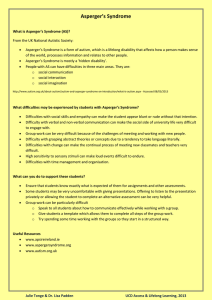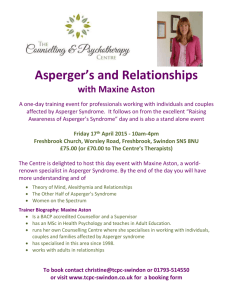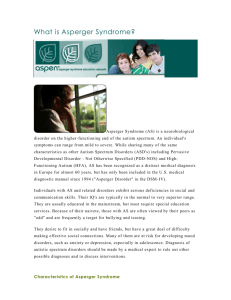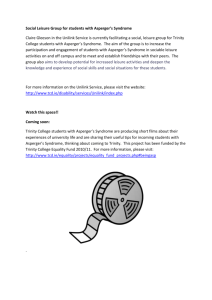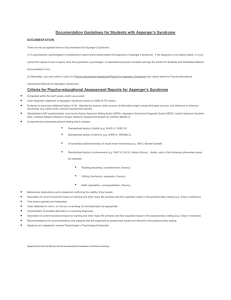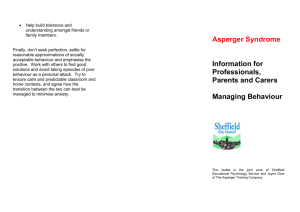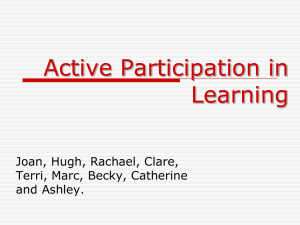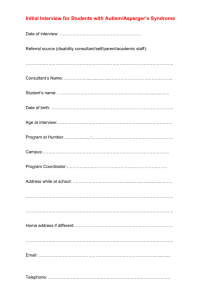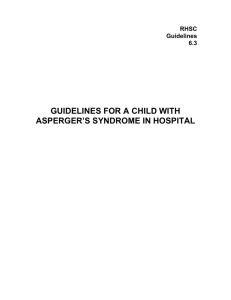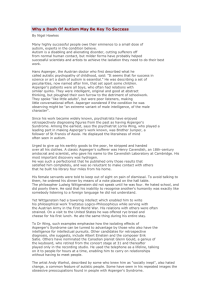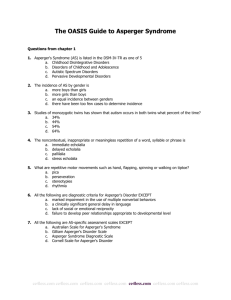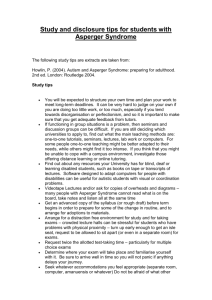Asperger`s Syndrome: Social development and learning
advertisement
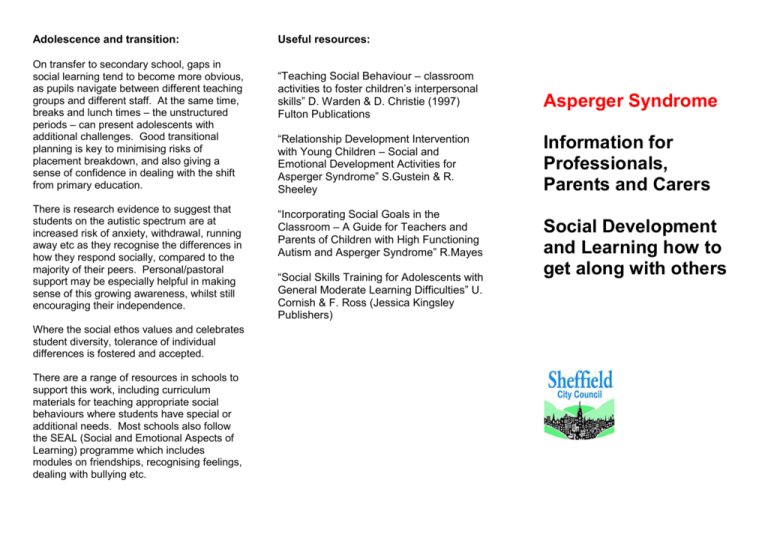
Adolescence and transition: On transfer to secondary school, gaps in social learning tend to become more obvious, as pupils navigate between different teaching groups and different staff. At the same time, breaks and lunch times – the unstructured periods – can present adolescents with additional challenges. Good transitional planning is key to minimising risks of placement breakdown, and also giving a sense of confidence in dealing with the shift from primary education. There is research evidence to suggest that students on the autistic spectrum are at increased risk of anxiety, withdrawal, running away etc as they recognise the differences in how they respond socially, compared to the majority of their peers. Personal/pastoral support may be especially helpful in making sense of this growing awareness, whilst still encouraging their independence. Where the social ethos values and celebrates student diversity, tolerance of individual differences is fostered and accepted. There are a range of resources in schools to support this work, including curriculum materials for teaching appropriate social behaviours where students have special or additional needs. Most schools also follow the SEAL (Social and Emotional Aspects of Learning) programme which includes modules on friendships, recognising feelings, dealing with bullying etc. Useful resources: “Teaching Social Behaviour – classroom activities to foster children’s interpersonal skills” D. Warden & D. Christie (1997) Fulton Publications “Relationship Development Intervention with Young Children – Social and Emotional Development Activities for Asperger Syndrome” S.Gustein & R. Sheeley “Incorporating Social Goals in the Classroom – A Guide for Teachers and Parents of Children with High Functioning Autism and Asperger Syndrome” R.Mayes “Social Skills Training for Adolescents with General Moderate Learning Difficulties” U. Cornish & F. Ross (Jessica Kingsley Publishers) Asperger Syndrome Information for Professionals, Parents and Carers Social Development and Learning how to get along with others . Encouraging children’s personal and social development is a priority for schools as well as for the family. It is an important set of skills needed to: Understand what is expected behaviour in different situations; Make sense of how and why others behave towards them in the way they do; Support growing independence; Deal with any possible bullying by others. The implications for children with Asperger Syndrome Even though many children and young people with Asperger Syndrome have good levels of intellectual ability and sometimes a well developed specialist interests/knowledge base, social and interpersonal skills are frequently an area of considerable tension and confusion. In large part, these difficulties are the result of having Asperger Syndrome. Difficulties experienced in dealing with social interaction reflect the specific characteristics of the condition – impairment of social communication, social relations and social imagination: There are a number of qualities and skills that are needed to successfully relate socially to others, including: Empathy – to be able to feel the change in mood of other people; Good communication and listening skills; Timing – eg starting up a conversation, closing one down; Awareness of the rights of others; That everyone is different and might hold different views of their own. Understanding social behaviours across different situations and then adjusting how we behave depends on: Cognitive development (intelligence); Moral understanding of what is right and wrong; Interpretation of motive or reason for the behaviour; Ability to understand that being different or special is OK . Difficulty in “reading” social cues in terms of body language, verbal and non-verbal cues, difficulty in recognising the unwritten rules in their community Limited awareness of the needs and rights of others, especially where these conflict with their own Sometimes a tendency towards a range of sensitivities and fixed ideas that might make them seem “at odds” with their peers Problems in the more subtle elements of communication – the use of humour, sarcasm, ambiguous language For some, an ability to be selfcontained, to be less needy of social contact with others for feeling satisfied, self-content, comfortable in their own familiar setting. Dislike of sudden and unplanned change and novelty, distressed by the unexpected, rigid. Seeing their own personal needs as a first priority and difficulty in adjusting to other people’s agendas, taking account of what interests them. Emotionally “flat” unless talking about own interests, poor or inappropriate support available, at risk of bully for the insensitivity. For many children, social skills are learned incidentally – as when a child watches another child and then copies their response. For those with Asperger Syndrome it is often essential to formally teach/practise them, making the reasons explicit.
